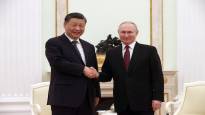Do you still remember the domino theory?
Brief recap: During the Cold War years in the United States, states were thought of as dominoes lined up. When the first piece in the row fell, it pushed the second and soon all the pieces were overturned, i.e. in the hands of the communists.
This thinking took the Americans to Vietnam and many other countries to kill and die so that the bricks would not just start falling.
Now the United States has become Ukraine’s biggest armed supporter. And the domino theory is being talked about again in Washington as well as in Brussels.
This time, Ukraine is seen as a pawn, behind which are Russia’s neighboring countries like Moldova and Armenia. The Baltic countries and Finland are at the tail end of the queue.
– If Russia is going to achieve something with the war, it will give it an incentive to continue the war somewhere else, chairman of the parliament’s foreign affairs committee Jussi Halla-aho (ps.) shaped For Helsingin Sanomat in February (you will switch to another service).
Halla-aho is not alone in his views.
– When Republican Senator Mitch McConnell and partners say that the US has a vital interest in Ukraine, they do not mean that the collapse of Ukraine directly threatens the US, writes the historian Robert Kagan in the prestigious Foreign Affairs magazine.
– They mean that the collapse of Ukraine would threaten the liberal world order, Kagan continues.
But are Halla-aho and Senator McConnell right?
Vietnam ended up being communist under control, but the feared chain reaction was not seen.
A domino effect from the loss of Ukraine is definitely possible, but is it likely? Or inevitable? Hardly anyone has an answer to this.
– The domino theory is popular because it is a simple way of looking at the world. Its roots lie in the birth of the Second World War. The idea is that you must not give up even an inch or it will backfire later elsewhere, says the professor of international politics and history Jussi Hanhimäki from the Geneva Graduate Institute.
According to Hanhimäki, who specializes in the Cold War, we cannot talk about the actual return of the domino theory, because it has never even left the scene of international politics.
Now the thought has just resurfaced.
– In the late 1970s, the Americans wanted the Soviet Union to fail in the occupation of Afghanistan. They feared that a victory would tempt the Kremlin to strike next at the Persian Gulf oil fields and the bricks would start to fall.
In the early 2000s George Bush Jr believed that a change of power in Iraq could lead to wider democratization in the Middle East.
Both assessments of the importance of Afghanistan and Iraq went wrong.
Even if the domino theory doesn’t explain world events very well, it still matters because many people in power believe in it.
In recent years, the Russian leadership has feared the spread of pro-Western color revolutions from one neighboring country to another and eventually to the streets of Moscow.
Such fears have contributed to Russia’s meddling in the politics of neighboring countries.
Europeans and Americans decision-makers partly play with different dominoes. The most important pieces for the United States today are in Asia and the Pacific.
When Russia launched a major attack on Ukraine more than a year ago, the phrase “Ukraine today, Taiwan tomorrow” started circulating on Taiwanese social media.
Bundling states together is easy on social media.
In terms of military strategy, it is difficult to think of countries more different than Ukraine and Taiwan. The latter is an island next to a powerful superpower.
However, the countries are united by the fact that both are threatened by an authoritarian superpower and in order to survive they need the support of the West. By distributing arms to Ukraine now, the US is not communicating its determination to Russia alone.
– China will certainly monitor how the West acts in relation to Ukraine. At least the war has taught China that the use of military force is always unpredictable, Professor Hanhimäki reflects.
Former US Secretary of Defense Robert McNamara once philosophized that all warfare is essentially communication—a way of speaking to current or future adversaries.
Of course, whether China wants to listen is a different matter.
